The neoclassical synthesis (NCS), neoclassical–Keynesian synthesis, or just neo-Keynesianism — academic movement and paradigm in economics that worked...
37 KB (4,761 words) - 07:25, 27 July 2024
The new neoclassical synthesis (NNS), which is occasionally referred as the New Consensus, is the fusion of the major, modern macroeconomic schools of...
8 KB (936 words) - 05:57, 22 April 2024
theory. Neoclassical economics is the dominant approach to microeconomics and, together with Keynesian economics, formed the neoclassical synthesis which...
53 KB (6,460 words) - 00:02, 17 July 2024
Economics (section New neoclassical synthesis)
macroeconomics it is reflected in an early and lasting neoclassical synthesis with Keynesian macroeconomics. Neoclassical economics is occasionally referred as orthodox...
175 KB (17,840 words) - 12:52, 19 August 2024
The new neoclassical synthesis developed as a consensus on the best way to explain short-run fluctuations in the economy. The new synthesis took elements...
16 KB (1,880 words) - 10:46, 21 June 2024
economic thought claim his legacy. Keynesian economics, as part of the neoclassical synthesis, served as the standard macroeconomic model in the developed nations...
107 KB (13,226 words) - 22:43, 18 August 2024
New Keynesian economics (redirect from New Keynesian Synthesis)
laissez faire policy would. New Keynesianism became part of the new neoclassical synthesis that incorporated parts of both it and new classical macroeconomics...
49 KB (6,199 words) - 02:07, 21 February 2024
prominence as part of the neoclassical synthesis, which was the post–World War II merger of Keynesian macroeconomics and neoclassical microeconomics that prevailed...
19 KB (1,955 words) - 05:20, 26 February 2024
decline of interest in these schools. After 1945, the neoclassical synthesis of Keynesian and neoclassical economics resulted in a clearly defined mainstream...
32 KB (3,189 words) - 17:17, 12 August 2024
General Theory with neoclassical microeconomics to create the neoclassical synthesis. By the 1950s, most economists had accepted the synthesis view of the macroeconomy...
57 KB (6,824 words) - 07:18, 30 July 2024


